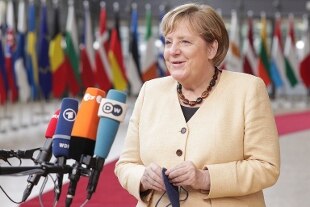Share
21 October 2021 Energy prices, Covid, trade, migration and digital transition but also the rule of law, but without formal conclusions, after the case of Poland, are the main topics on the agenda for the European Council to be held in Brussels on 21 and 22 October .
"The question (of Poland, ed) will be dealt with, even at the request of some states, but
there will be no formal conclusions
. Also because it is not within the competence of the Council to make proposals. The Commission is the guardian of the Treaties and we have all seen the debate in the European Parliament in which President Ursula von der Leyen explained the three options that the Commission has ", clarified an EU source.
Leaders arrive in Brussels
German Chancellor
Angela Merkel
leaves the scene with an invitation to dialogue: "An avalanche of lawsuits at the European Court of Justice is not the solution to the problem of the rule of law" in the European Union, Merkel said referring to the clash between Brussels and Poland before of the start of the EU leaders' summit.
The question, Merkel observed, is "how the individual member states imagine the European Union to be, increasingly integrated" or made up of "more nation states", and "this is certainly not just a problem between Poland and the EU. ". According to the Chancellor, the conference on the future of Europe is "a good place" to discuss this.
Polish Prime Minister
Mateusz Morawiecki
, in conflict with Brussels on the independence of justice and the primacy of European law, said he was "ready for dialogue", rejecting however "the pressure of blackmail". "We will not act under the pressure of blackmail (but) we are ready for dialogue. We will of course discuss how to resolve the current disputes, "said Morawiecki upon his arrival at the European summit taking place in Brussels.
"It is difficult to see how a new important sum of money, such as that of the Next Generation Eu, can be made available to Poland when this issue has not yet been settled", said the Dutch premier,
Mark Rutte.
, upon his arrival at the European Council. "I think the Council also has a role, we can continue to work on Article 7, which is our way to tackle the issue," he added. "In the meantime, the Commission must take action to ensure that the independence of the judiciary in Poland is guaranteed", Rutte reiterated.
"The fact is very clear: the primacy of EU law does not exist precisely in the treaty, it is a question of competences. What happens is that the European institutions circumvent national law and modify the treaty without any legitimacy to do so", he said. declared Hungarian Prime Minister
Viktor Orban
upon his arrival in Brussels. "Poland is right: national law takes precedence over competences not transferred to the EU, there is no question, "added Orban.

